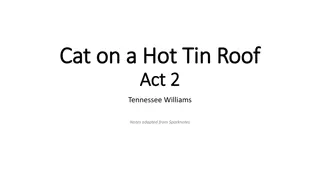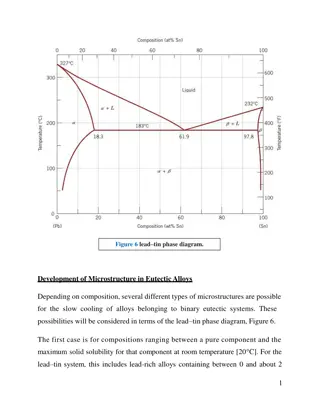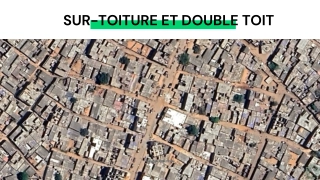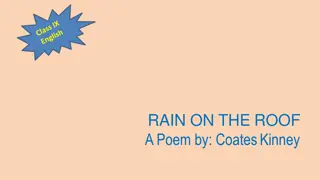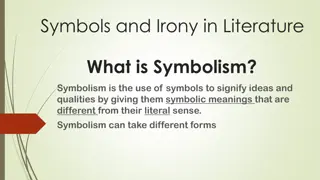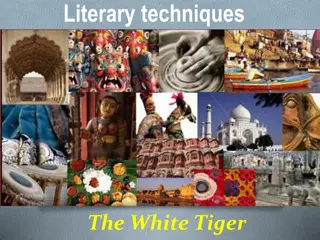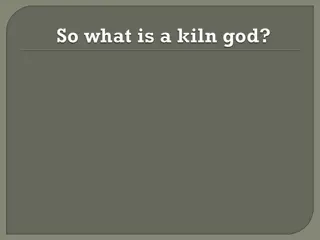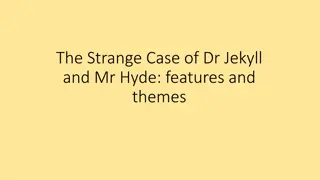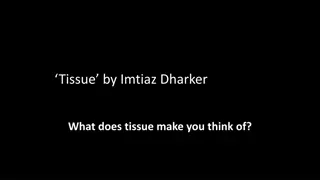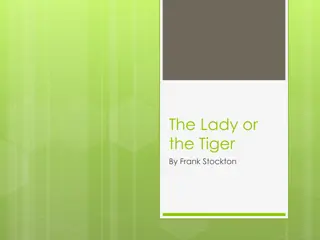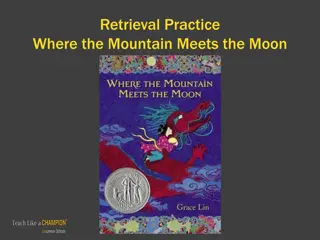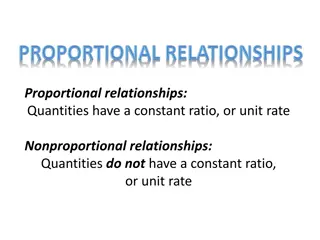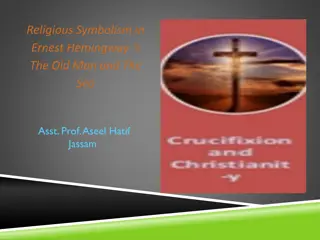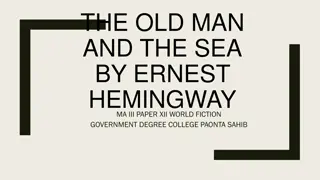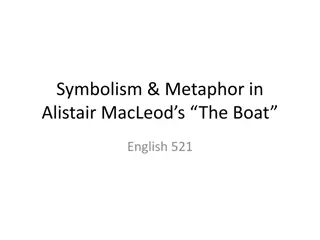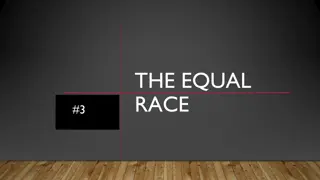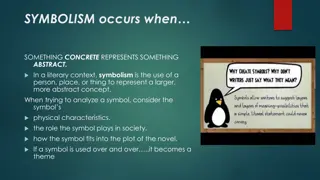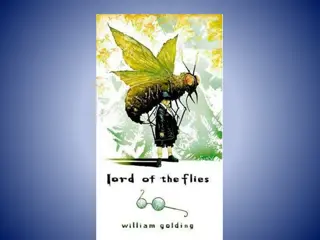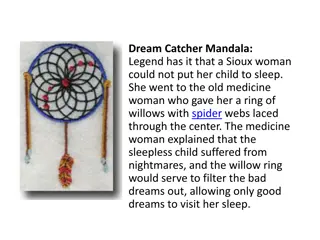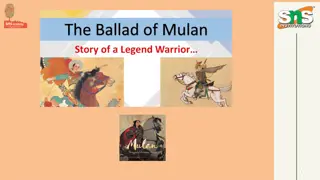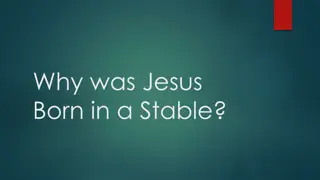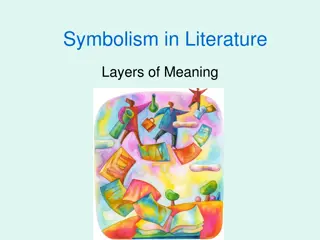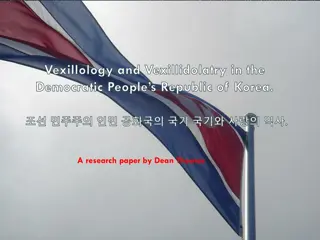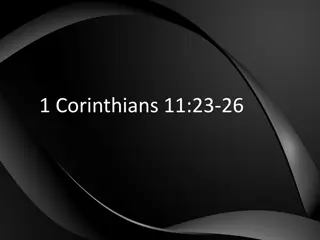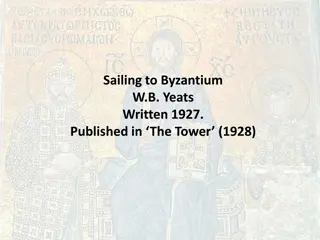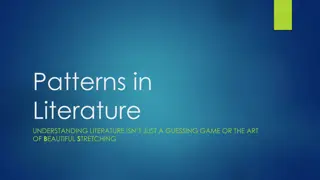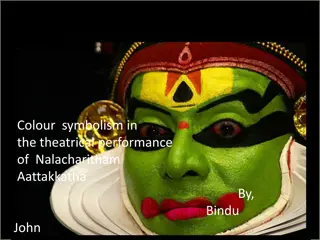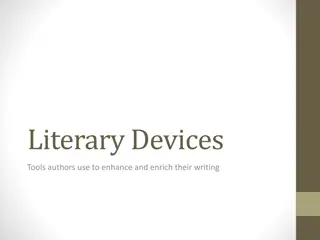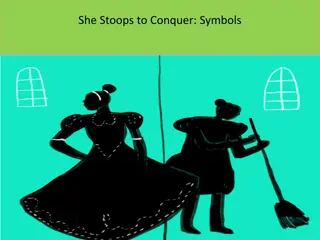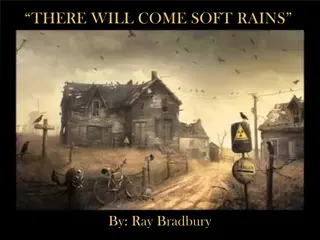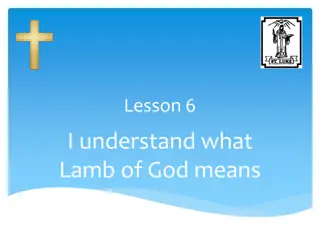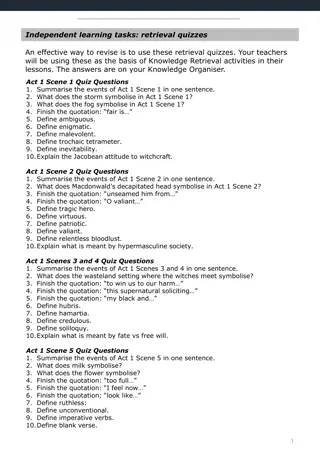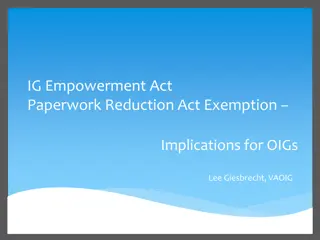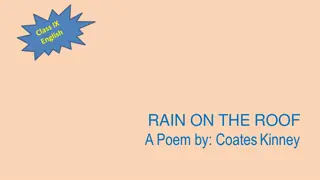Analysis of Relationships and Symbolism in "Cat on a Hot Tin Roof" Act 1
Act 1 of "Cat on a Hot Tin Roof" by Tennessee Williams delves into the complex relationships between characters such as Maggie and Brick, exploring themes of desire, indifference, and the impact of childlessness. Through symbolic elements like Brick's crutch and Maggie's longing for motherhood, the play unravels a gripping narrative of dysfunction within a Southern family. The characters' interactions and struggles set the stage for a compelling exploration of identity, fertility, and societal expectations.
Uploaded on Sep 12, 2024 | 2 Views
Download Presentation

Please find below an Image/Link to download the presentation.
The content on the website is provided AS IS for your information and personal use only. It may not be sold, licensed, or shared on other websites without obtaining consent from the author. Download presentation by click this link. If you encounter any issues during the download, it is possible that the publisher has removed the file from their server.
E N D
Presentation Transcript
Cat on a Hot Tin Roof Cat on a Hot Tin Roof Act 1 Act 1 Tennessee Williams Notes adapted from SparkNotes.
Act 1 Act 1 - - Task Task In groups, discuss: Maggie and Brick s relationship The use of symbolism Brick s crutch; Maggie s Diana trophy The use of setting, particularly the bed and the console The role of Big Mama Mae and the child, Dixie Brick and Skipper s relationship
Act 1 Act 1 Cat begins with a scenario familiar to Williams's readers, presenting a hysterical, dissatisfied woman who prostrates herself before a man. Against the indifferent Brick, the frantic Maggie is the image of a woman falling to pieces. Note in particular how Williams emphasizes Maggie's relation to the image of femininity throughout Act I. Here she appears changing her clothes, posing before the mirror, and preparing herself for the party. She is at her most seductive and most vulnerable, yet utterly unable to lure her husband's desire. His gaze of disgust freezes her in the glass note Williams's use of the pause here and precipitates her "hideous transformation" into "Maggie the Cat." As the woman in the mirror, Maggie becomes the most fascinating character of the play. Williams indicates that she holds the audiences transfixed. Her frustrated desire drives the act forward. Indeed, the exhilaration of Williams's dramaturgy so often lies in the force of the audience's identification with heroines like Maggie, women desperate in their sense of lack, women masochistically bound to men who do not want them for reasons, women who would appear all the more beautiful in their envy, longing, and dispossession. As she tells Brick, if he was to never make love to her again, she would stab herself in the heart.
Act 1 Act 1 Maggie's dispossession also lies not only in her husband's indifference but in her childlessness as well. Certainly her childlessness calls her status as wife, and "normal" woman, into question. Without a child, her and Brick's place in Big Daddy's household is not secure. This crisis is immediately precipitated by Daddy's imminent death. The child here functions entirely to assure their bid as Daddy's rightful heirs. The question of childlessness underpins Maggie's bitter rivalry with her and Brick foils or doubles: Mae and Gooper. Within Cat then, fertility, the family, and, to some extent, the mother, will appear hilariously grotesque. Mae and Gooper have spawned a litter of "no-necked monsters" fit for the county fair.
Act 1 Act 1 In contrast to the frantic Maggie, Brick would locate himself on the far side of this family drama. On the brink of deliquescence, he possesses the charm of those who have given up and assumed a pose of indifference before the world. Brick embodies an almost archetypal masculinity. Before this "Brick," Maggie can only find herself in the throes of desire. As Maggie laments, Brick's enviable coolness made him the most wonderful lover. As we will see, it also casts aspersions on his sexuality. Though enviably cool, Brick is also an obviously broken man, ruined by inadmissible desires. Note in particular how he stumbles through the play, continually dropping his crutches or losing them at the hands of others. As we will see, Brick's injury functions as a symbol of his unmanning or, more precisely, castration. Here it will enable Maggie to raise the question of the unmanly desires he keeps under wraps. Maggie's refusal to abide by the "laws of silence," her repression, begins to crack his wall.
Act 1 Act 1 The scene also introduces us to setting for the entire play, the bed-sitting room of Big Daddy's manor. Though all of Williams's stage notes merit careful consideration, we should be sure to mark the setting's explicitly symbolic elements. First the room formerly belonged to the plantation's original owners, Jack Straw and Peter Ochello, and Williams writes that the ghost of their love haunts the room. Brick and Maggie's bed, the place where, as Big Mama will observe, the rocks in their marriage lie, was originally theirs. Second, a gloriously grotesque console, combining a radio-phonograph, television, and liquor cabinet, towers over the room. As Williams notes, it serves as shrine to the "comforts and illusions" behind which people hide from the things the characters face. Mark especially then the moments when Brick will go to the console and, for example, turn on the radio, refresh his drink, and onward, raising a screen between him and the world.
Act 1 Act 1 The second portion Act I stages Maggie's humiliation and her pathetically comic attempt to seduce Brick. Williams punctuates her clash with Brick with two interruptions: Mae's and Big Mama's. Note how he does so self-consciously and how Mae announces that intermission is over upon her exit. Though Act I unfolds primarily between Maggie and Brick, the audience is always made aware of the potential for such interruptions through, for example, off-stage noise and references in the dialogue. As Mama remarks, no one is to have privacy in her house. Mae's entrance introduces us to the rivalry between the play's two cats . Mae brings with her a particularly symbolic object: Maggie's Diana trophy. Maggie is figured through a number of tropes of virginity. Earlier, she sarcastically refers to herself as "Saint Maggie"; at the close of the play, Mae will joke that the only way she could have conceived of a child is immaculately. The desperate Maggie is subject to a miserable second virginity, a virginity that again stands in the logic of the play against the grotesqueness of fertility. At the risk of being glib, we should note also that Maggie's trophy symbolizes her status as Brick's trophy wife.
Act 1 Act 1 Upon Mae's exit, Maggie cracks under the weight of her desire. Though she continually attempts to return to more everyday conversation, she ultimately finds herself unable to bear her envy, longing, and the inhuman conditions of her marriage. She attempts to seduce her husband. Embarrassed for her, Brick fends her off like a lion-tamer. The dissatisfied Maggie collapses into hysterical laughter before her grinning husband apparently the scene is all too familiar to them. Maggie can only protest weakly at the injustice of Mama's decree that the rocks in their marriage lie with her. Maggie appears utterly alone and bound to a man who does not desire her. Her exceptionally poignant pose before the mirror and pleading attempt to make Brick jealous only leads him to dismiss her indifferently. Her rhetoric here is hardly innocent. We can summarize it as arguing: "other men want me, so you should too." The importance of the other man in the couple's relationship will become clear in the following scene.
Act 1 Act 1 Despite her plea, Brick, as Williams notes, stares at her still as if passing a ball to a teammate. Ultimately Maggie finds herself before the mirror anew, her image undergoing another hideous transformation, an estrangement or depersonalization: "I am Maggie the Cat!" she cries. This scene is also Big Mama's introduction. Bedecked in flashy gems, Mama is the tragic embodiment of bad taste: fat, breathless, sincere, earnest, occasionally grotesque, and embarrassingly dedicated to a man who despises her. Here she functions, as at the close of the play, as the na ve bearer of the myths of marriage and family. Her investment in these myths will become clear in Act II. Unlike the poised and ironic Maggie, she is a woman bound a man who does not want her and in feeble denial of his disgust. She is sympathetic as an object of the audience's affectionate indulgence. Finally, this scene also makes use of a device of which the play makes great use: the off-stage telephone. As noted above, the continuous interruption of off-stage voices mark the presence of spies in the household. Here the telephone conversation rehearses the lie that keep Big Daddy and Mama ignorant of the machinations afoot, the lie that Daddy will live.
Act 1 Act 1 Having finishes dressing before her indifferent husband, Maggie finds herself with nothing to do. Finally she forces the secret between them. The desire between Brick and Skipper is something that the former cannot avow. Here, as if possessed by a will to bring this desire to light, Maggie breaks into a recitation to elaborate on the triangle they once shared. Her compelling revelation is one of the play's more melodramatic, if not soap operatic, moments. They are characterized by the emotional excess and high histrionics of the hysterical heroine. As Maggie's recitation makes clear, the only true love in Brick's life lay between he and his friend Skipper. Maggie sketches the triangle between the three of them. As she recalls, she accompanied the two football heroes for the benefit of the public Maggie is nothing if not the trophy wife. In contrast, Brick and Skipper's love assumes almost mythic dimensions: as Maggie relates that it was the stuff of Greek legend. For Brick, it remains the only true and good thing in his life. Note also the nostalgic nature of their love affair. For example, Brick's return to the high school athletic field is a turn to time lost.
Act 1 Act 1 As Maggie notes, theirs was a love that dare not speak its name, a love that could not be satisfied or discussed. Thus Maggie and Skipper abruptly found themselves aligned before the man they both want, a god inaccessible to them both. They made love to dream that Brick was theirs. Finally Skipper's death shifts the triangle anew. Brick withdraws into mourning, abandoning the world in grief. His mourning is made all the more difficult by a desire he cannot avow. The dead man continues to intervene between husband and wife, and Maggie protests that she is alive in vain. Sending Brick into a murderous and panicked rage, Maggie's revelation of the repressed finally shatters her husband's coolness. Brick would silence her at all costs. Crucially, his "unmanning" or castration that is, the revelation of desires which call his masculinity into question is symbolized and, at the level of the action at least, made possible by his injury. This unmanning will appear more clearly in his dialogue with Big Daddy in Act II.
Act 1 Act 1 What interrupts Brick's attack is Dixie's entrance, one of the play's many to use Williams's terms "incongruous" but "perfectly timed" interruptions from off- stage. Dixie returns us to Maggie's plight. This grotesque, monkey-like child embodies what Maggie lacks. As she jeers, Maggie is childless, saying that she probably cannot even have babies. Here Maggie makes her sad, resolute pledge: to bear a child by a man who despises her. Maggie believes that her child would make good on her lack, assure her place in the family, and save her marriage. Thus Act I leaves us with a disaster that remains for a time in suspense. Donning her public face, Maggie turns to meet the family. Before proceeding with Daddy's birthday party, however, we should also here how Maggie would serve as intermediary for the love between men in a different triangle, one involving Brick and Big Daddy. Here Maggie gives Daddy with a gift in Brick's name, a gift with which Brick will have nothing to do with. We will see this structure repeated in her gift of the child.


